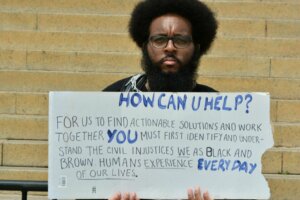It was just last year when Black Lives Matter demonstrations flooded the streets of D.C. following the murder of George Floyd by Minneapolis police.
Activist and educator Roger Campbell II delivered a speech at a June 6 protest titled “Black Lives: A Glance Through the Looking Glass,” that left demonstrators in tears.
Standing on the steps of the Lincoln Memorial, Campbell answered the burning question many supporters have asked: “How can I help?”
“You should try to understand where we as Black and brown humans are coming from,” Campbell said, “and the civil injustices that we experience every day of our lives.”
I was in the crowd filming the event for WTOP. Unbeknown to Roger, his speech would become the centerpiece of a video I was producing.
I found out a few weeks ago that same video won a Gold Telly Award for Social Impact.
I was honored to win the award, but felt it was just as much Roger’s as mine. I reached out to him to let him know about the award. When we were talking, I asked him to visit the Lincoln Memorial with me to reflect on the speech in the same spot where he delivered it, and to talk about where both he and the nation are one year later in the fight for social justice.
“Never in my life have I ever done anything like that,” Campbell said. “Walking into reading my speech, my hands were shaking, and by the end, they still were.”
Campbell was shocked by the recording of his presentation and described the experience as a cosmic event of destiny.
“For [you] to be there, and then catch me from walking down the stairs to starting to read the speech and catching someone hand me a mic so everyone could hear me, and then in turn submitting that and winning a Gold Telly — it’s just more than I could have ever imagined, and I’m humbled by the experience,” Campbell said.
‘Losing her really hurt’
Just weeks after giving his speech at the Lincoln Memorial, Roger told me his mother passed away.
“Losing her really hurt, and it kind of took away the drive I had to write. Not in the sense of not wanting to, but just not having that in my heart at the moment. So, what I did was I forwarded that momentum and those emotions of losing my mother into trying to help others,” he said.
While he participated in a few other demonstrations after June 6, he didn’t speak at any of them.
Campbell has since dedicated his life to educating people.

As a software engineer, he teaches high school students how to code and trains military veterans on software technologies. Campbell prides himself on the ability to use his knowledge to help people meet their goals and gain access to industry-leading jobs.
During our conversation, we also spoke about where the U.S. has come in the past year on the racial justice front and some of the major events that have occurred in that same time frame.
On June 17, 2021, President Joe Biden signed the Juneteenth National Independence Day Act, establishing June 19 as a federal holiday. And, former police officer Derek Chauvin was convicted and sentenced to 22.5 years in prison for the murder of George Floyd.
“I am happy that he was convicted, happy that he was sentenced to a decent amount of time behind bars, and I’m very glad to see he wasn’t released on probation like he was looking for,” Campbell said.
When asked about his thoughts on police reform, Campbell described the anxiety he feels when an officer pulls up behind him, even if he’s not being pulled over.
He said he believes the best way to heal the mistrust between the community and law enforcement is to educate police about the different cultures in the communities they serve, and allow them to be more involved outside of policing.
“Unfortunately, I don’t think we’ve seen enough happening in the Black community, but I do think that we have made an impact,” Campbell said. The protest lit a fuse and started a much-needed conversation that is raising cultural awareness in organizations across the nation.
“I’ve had people that I’ve known for years tell me that their companies are actually — for once — asking them how they feel about the culture of the company, or if they have ever been discriminated while working on the job,” Campbell said. “I think that’s something that hasn’t really happened before.”
Keep it going
While recognizing the movements forward, Campbell said it’s up to the community to keep the momentum going.
Taking it a step farther than protests and demonstrations, Campbell said we need to educate communities on ways to fight systemic racism on an individual basis. “Electing a president is not it.”
Campbell believes change is made not only by people participating and voting in local and federal elections, but by holding those elected officials accountable.
As we wrapped up our discussion, Campbell shared what he hopes people will remember most.
“Follow your heart and speak up when you see something wrong,” he said. “It’s about people standing up and doing what they think is right. That’s how we can make actionable solutions and make things better for everyone.”
You can read Campbell’s essay here and listen to his original speech here.







